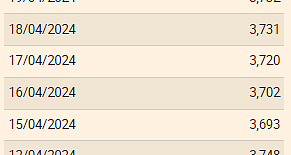The assessments could hardly be further apart. Two out of three Americans, 64 percent, see China as a major military threat to the United States. In Germany, on the other hand, only seven percent of respondents think that China is a threat to Germany.
Every second German (51 percent) says: China does not pose a military threat. In the USA, just seven percent hold this view. The survey data, compiled by the Washington think tank Pew and the Körber Foundation, correspond to the public debate in Germany and the USA as far as the relationship with Beijing is concerned.
China is omnipresent in the United States. Just last week, President Joe Biden's administration named the People's Republic - and not Russia - as the greatest geopolitical threat. "Beijing wants to expand its sphere of influence in the Indo-Pacific region and become the leading power in the world," says the American national security strategy. From the US perspective, China is the only competitor that wants to transform the international order and has the economic, military and technological power to do so.
As the world's leading power, the United States naturally views any country that could potentially outperform it as a challenge. In this respect, Germany, which is neither a leading world power nor wants to be, looks at an emerging power like China with different eyes.
But the view of Beijing from Washington and Berlin also differs in other respects. For decades, Germany and the US nurtured China, which supported its admission to the World Trade Organization (WTO) in 2001.
Both countries traded and still trade with China: Germany relies primarily on the People's Republic as a sales market, while the USA mainly imports cheap goods from China. And even more: Germany even pays development aid to China, in 2020 around half a billion euros.
In recent years, however, Germany and the USA have been dealing with China more differently than in previous decades. Joe Biden has effectively adopted the attitude critical of Beijing that his predecessor Donald Trump established. He does not use Trump's aggressive and polemical rhetoric. On the matter, however, the US President is taking even more consistent action against China, as the security strategy shows, for example.
"That's the usual language," says China correspondent Frank Sieren on Xi Jinping's speech on the Taiwan conflict. Although it is new that the Chinese head of state is emphasizing the clout of his military, one can still speak of the status quo.
Source: WORLD
Despite enormous inflation and price pressure, Biden has not relaxed or even abolished the punitive tariffs imposed by Trump on Chinese imports. So far there are no indications of such plans.
Foreign Minister Antony Blinken fought a fierce verbal duel with his Chinese colleague right at the beginning of Biden's term in office. The US relationship with China will be "competitive where it should be, cooperative where it can be, and adversarial where it must be," Blinken said. Many Americans have little faith in US democracy, Beijing's foreign policy officer Yang Jiechi accused Blinken. That set the tone.
Germany, on the other hand, is still cautious about China's Communist Party, which is currently celebrating its 20th congress. Under Chancellor Angela Merkel (CDU), the motto was "change through trade", although in reality it was only about trade and never about change.
Merkel traveled to China once a year, taking dozens of business leaders with her and reciting the formulas of China's historical significance. While she received the Dalai Lama at the beginning of her chancellorship (to the annoyance of appeasement foreign minister Frank-Walter Steinmeier (SPD)), such a step was unthinkable in the final years of her government.
At the beginning of November, Chancellor Olaf Scholz (SPD), a foreign policy novice, wants to travel to Beijing to meet President Xi Jinping. This was first reported by "Politico". Scholz would also like to take company bosses with him, after all, China is Germany's largest trading partner. Neither politicians nor companies seem to see this as a problem. Meanwhile, the China strategy of Foreign Minister Annalena Baerbock (Greens), almost a year in office, is still a long way off.
In the US, meanwhile, China's military aggression in the Taiwan Straits is viewed with eagle eyes. House Speaker Nancy Pelosi visited the island, which considers itself independent.
Only a delegation of relatively unknown members of the German Bundestag made the trip to Taipei from Germany in October. Pelosi also repeatedly addresses the fate of the Uyghurs, the Muslim minority persecuted by Beijing. In Berlin one hears about it far less often.

 The Euribor today remains at 3.734%
The Euribor today remains at 3.734% Germany: the trial of an AfD leader, accused of chanting a Nazi slogan, resumes this Tuesday
Germany: the trial of an AfD leader, accused of chanting a Nazi slogan, resumes this Tuesday New York: at Columbia University, the anti-Semitic drift of pro-Palestinian demonstrations
New York: at Columbia University, the anti-Semitic drift of pro-Palestinian demonstrations What is Akila, the mission in which the Charles de Gaulle is participating under NATO command?
What is Akila, the mission in which the Charles de Gaulle is participating under NATO command? What High Blood Pressure Does to Your Body (And Why It Should Be Treated)
What High Blood Pressure Does to Your Body (And Why It Should Be Treated) Vaccination in France has progressed in 2023, rejoices Public Health France
Vaccination in France has progressed in 2023, rejoices Public Health France Food additives suspected of promoting cardiovascular diseases
Food additives suspected of promoting cardiovascular diseases “Even morphine doesn’t work”: Léane, 17, victim of the adverse effects of an antibiotic
“Even morphine doesn’t work”: Léane, 17, victim of the adverse effects of an antibiotic MEPs validate reform of EU budgetary rules
MEPs validate reform of EU budgetary rules “Public Transport Paris 2024”, the application for Olympic Games spectators, is available
“Public Transport Paris 2024”, the application for Olympic Games spectators, is available Spotify goes green in the first quarter and sees its number of paying subscribers increase
Spotify goes green in the first quarter and sees its number of paying subscribers increase Xavier Niel finalizes the sale of his shares in the Le Monde group to an independent fund
Xavier Niel finalizes the sale of his shares in the Le Monde group to an independent fund Owner of Blondie and Shakira catalogs in favor of $1.5 billion offer
Owner of Blondie and Shakira catalogs in favor of $1.5 billion offer Cher et Ozzy Osbourne rejoignent le Rock and Roll Hall of Fame
Cher et Ozzy Osbourne rejoignent le Rock and Roll Hall of Fame Three months before the Olympic Games, festivals and concert halls fear paying the price
Three months before the Olympic Games, festivals and concert halls fear paying the price With Brigitte Macron, Aya Nakamura sows new clues about her participation in the Olympics
With Brigitte Macron, Aya Nakamura sows new clues about her participation in the Olympics Skoda Kodiaq 2024: a 'beast' plug-in hybrid SUV
Skoda Kodiaq 2024: a 'beast' plug-in hybrid SUV Tesla launches a new Model Y with 600 km of autonomy at a "more accessible price"
Tesla launches a new Model Y with 600 km of autonomy at a "more accessible price" The 10 best-selling cars in March 2024 in Spain: sales fall due to Easter
The 10 best-selling cars in March 2024 in Spain: sales fall due to Easter A private jet company buys more than 100 flying cars
A private jet company buys more than 100 flying cars This is how housing prices have changed in Spain in the last decade
This is how housing prices have changed in Spain in the last decade The home mortgage firm drops 10% in January and interest soars to 3.46%
The home mortgage firm drops 10% in January and interest soars to 3.46% The jewel of the Rocío de Nagüeles urbanization: a dream villa in Marbella
The jewel of the Rocío de Nagüeles urbanization: a dream villa in Marbella Rental prices grow by 7.3% in February: where does it go up and where does it go down?
Rental prices grow by 7.3% in February: where does it go up and where does it go down? Europeans: “All those who claim that we don’t need Europe are liars”, criticizes Bayrou
Europeans: “All those who claim that we don’t need Europe are liars”, criticizes Bayrou With the promise of a “real burst of authority”, Gabriel Attal provokes the ire of the opposition
With the promise of a “real burst of authority”, Gabriel Attal provokes the ire of the opposition Europeans: the schedule of debates to follow between now and June 9
Europeans: the schedule of debates to follow between now and June 9 Europeans: “In France, there is a left and there is a right,” assures Bellamy
Europeans: “In France, there is a left and there is a right,” assures Bellamy These French cities that will boycott the World Cup in Qatar
These French cities that will boycott the World Cup in Qatar Serie A: Bologna surprises AS Rome in the race for the C1
Serie A: Bologna surprises AS Rome in the race for the C1 Serie A: Marcus Thuram king of Italy, end of the debate for the position of number 9 with the Blues?
Serie A: Marcus Thuram king of Italy, end of the debate for the position of number 9 with the Blues? Milan AC-Inter Milan: Thuram and Pavard impeccable, Hernandez helpless… The tops and flops of the derby
Milan AC-Inter Milan: Thuram and Pavard impeccable, Hernandez helpless… The tops and flops of the derby Ligue 2: Auxerre leader, Bordeaux in crisis, play-offs... 5 questions about an exciting end of the season
Ligue 2: Auxerre leader, Bordeaux in crisis, play-offs... 5 questions about an exciting end of the season


















